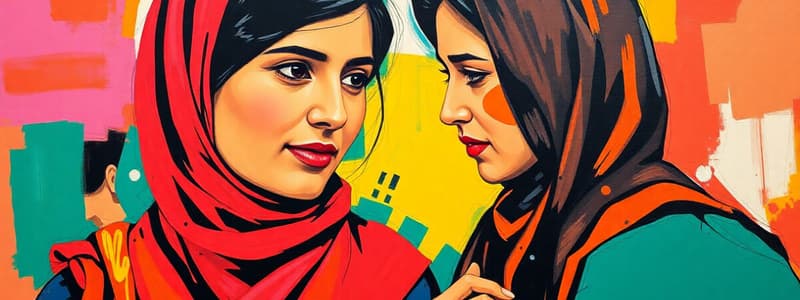Podcast
Questions and Answers
Moniba's initial reaction to discovering Malala's secret diary primarily reveals which aspect of their friendship?
Moniba's initial reaction to discovering Malala's secret diary primarily reveals which aspect of their friendship?
- A pragmatic understanding of the dangers associated with public expression in their community.
- A fragile bond easily broken by disagreements and personal secrets.
- A deep-seated jealousy of Malala's writing abilities and public recognition.
- An expectation of complete transparency and shared experiences within their close relationship. (correct)
Malala's father's unintentional disclosure of her diary authorship to a reporter highlights the complex interplay between:
Malala's father's unintentional disclosure of her diary authorship to a reporter highlights the complex interplay between:
- The conflict between personal privacy and the urgency of political activism.
- Cultural norms regarding family secrets and journalistic ethics.
- The desire for parental protection and the inevitability of truth surfacing. (correct)
- Generational differences in understanding the risks of public exposure.
The phrase 'But the diary had done its job' implies that the primary purpose of Malala's diary was to:
The phrase 'But the diary had done its job' implies that the primary purpose of Malala's diary was to:
- Amass international recognition and elevate personal status.
- Amplify awareness and galvanize action against the Taliban's edicts. (correct)
- Serve as a therapeutic outlet for processing fear and anxiety.
- Document personal experiences for future historical analysis.
The criticism leveled against Malala's mother by her friends for Malala's TV appearances primarily reflects:
The criticism leveled against Malala's mother by her friends for Malala's TV appearances primarily reflects:
Malala's statement, 'Fazlullah's men wear masks...because they are criminals. But I have nothing to hide,' primarily employs which rhetorical device?
Malala's statement, 'Fazlullah's men wear masks...because they are criminals. But I have nothing to hide,' primarily employs which rhetorical device?
Malala’s mother's silent support, despite potential personal reservations and societal criticism, exemplifies:
Malala’s mother's silent support, despite potential personal reservations and societal criticism, exemplifies:
Malala's pride in showing her identity and speaking out for girls' education is best interpreted as an assertion of:
Malala's pride in showing her identity and speaking out for girls' education is best interpreted as an assertion of:
The mention of 'more than fifty thousand' girls potentially being affected by the 'madman's' actions serves to primarily:
The mention of 'more than fifty thousand' girls potentially being affected by the 'madman's' actions serves to primarily:
Considering the social context, the act of Malala 'showing her face on TV' can be interpreted as a:
Considering the social context, the act of Malala 'showing her face on TV' can be interpreted as a:
The juxtaposition of 'Fazlullah's attempt to shut down the girls' schools of Pakistan' with Malala's diary and public appearances illustrates:
The juxtaposition of 'Fazlullah's attempt to shut down the girls' schools of Pakistan' with Malala's diary and public appearances illustrates:
Flashcards
Gul Makai
Gul Makai
Malala's secret identity as a diarist for girls' education.
Fazlullah
Fazlullah
Leader attempting to shut down girls' schools in Pakistan.
The New York Times
The New York Times
Newspaper that reported on Malala's story.
Courage in Identity
Courage in Identity
Signup and view all the flashcards
Supportive Mother
Supportive Mother
Signup and view all the flashcards
Public Speaking
Public Speaking
Signup and view all the flashcards
Fear and Courage
Fear and Courage
Signup and view all the flashcards
Secret Confession
Secret Confession
Signup and view all the flashcards
Media Attention
Media Attention
Signup and view all the flashcards
Criticism from Friends
Criticism from Friends
Signup and view all the flashcards
Study Notes
Malala's Experience
- Malala's friend, Moniba, became angry after Malala confessed a secret
- Malala's father disclosed a story about threatening to kill her to a reporter
- A diary, written as 'Gul Makai', revealed the story of Fazlullah targeting girls' schools
- Multiple reporters, including a New York Times reporter, followed the story
- Many people in Mingora thought Malala did well talking to the press
- Some of Malala's mother's friends were upset by her TV appearances
- Her mother might have preferred that she wore a veil
- Malala's friends questioned why she showed her face, and she answered her critics
- Malala was proud of her advocacy work
- She had nothing to hide and is proud of her identity
- A madman's violence impacted 50,000 people
Studying That Suits You
Use AI to generate personalized quizzes and flashcards to suit your learning preferences.




